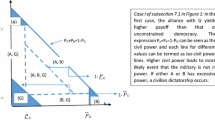Abstract
Most models of the formation of political coalitions use either Euclidean spaces or rely purely on game theory. This limits their applicability. In this article, a single model is presented which is more broadly applicable. In principle any kind of set can be used as a policy space. The model is also able to incorporate different kinds of party motivations: both rent-seeking and idealism. The model uses party preferences and power to identify stable coalitions and predict government policy as well as to indicate which member of the opposition will be able to break up the governing coalition if no stable coalition exists. In the latter case it will also indicate on which issue the government is likely to split. Parties may have preferences over issues such as the composition of cabinet and/or the governing coalition as well as the more traditional issues of government formation. The model also provides a rationale for log-rolling.
Article PDF
Similar content being viewed by others
Avoid common mistakes on your manuscript.
References
Baron D. (1991), A spatial bargaining theory of government formation in parliamentary systems. American Political Science Review. 8(1): 137–164
Berghammer, R., Rusinowska, A. and De Swart, H. (forthcoming). Applying relational algebra and RelView to coalition formation, European Journal of Operational Research.
Black D. (1958). The Theory of Committees and Elections. Cambridge University Press, Cambridge
Brams S. (1975). Game Theory and Politics. The Free Press, New York
De Swaan A. (1973). Coalition Theories and Cabinet Formation. Elsevier, Amsterdam
Downs A. (1957). An Economic Theory of Democracy. Harper & Row Publishers, New York
Dunleavy P. (1991). Democracy, Bureaucracy and Public Choice: Economic Explanations in Political Science. Harvester Wheatsheaf, Hertfordshire
Edelman P. (1997). A note on voting. Mathematical Social Sciences 34: 37–50
Eklund, P., Rusinowska, A., De Swart, H. A Consensus Model of Political Decision-making. Umea University/Tilburg University, Mimeo
Hotelling H. (1929). Stability in competition. The Economic Journal 39: 41–57
Kilgour D. (1974). A shapley value for cooperative games with quarreling. In: Rapoport A. (eds.), Game Theory as a Theory of Conflict Resolution. Reidel, Boston
Kirchsteiger G., Puppe C. (1997). On the formation of political coalitions. Journal of Institutional and Theoretical Economics 153: 293–319
Laurelle A., Valenciano F. (2005). Assessing success and decisiveness in voting situations. Social Choice and Welfare 24: 171–197
Laver M., Shepsle A. (1996). Making and Breaking Governments. Cambridge University Press, Cambridge
McKelvey R. (1976), Intransitivities in multidimensional voting models and some implications for agenda control. Journal of Economic Theory 12: 472–482
Ordeshook P. (1997). The spatial analysis of elections and committees: four decades of research. In: Mueller D. (eds.) Perspectives on Public Choice: A Handbook. Cambridge University Press, Cambridge
Peleg B. (1981) Coalition formation in simple games with dominant players. International Journal of Game Theory 10: 11–33
Plott C. (1967). A notion of equilibrium and its possibility under majority rule. American Economic Review 57: 787–806
Riker W. (1962), The Theory of Political Coalitions. Yale University Press, New Haven
Roubens, M., Rusinowska, A. and De Swart, H. (forthcoming). Using MACBETH to determine utilities of governments to parties in coalition formation, European Journal of Operational Research.
Rusinowska A., De Swart H., Van der Rijt J. (2005), A new model of coalition formation. Social Choice and Welfare 24: 129–154
Rusinowska, A. and De Swart, H. Negotiating a Stable Government – an Application of Bargaining Theory to a Coalition Formation model, Tilburg University, Mimeo.
Taylor M., Laver M. (1973), Government coalitions in western Europe. European Journal of Political Research 1: 205–248
Thijssen, J., Hendrickx, R. and Borm, P. (2002), Spillovers and strategic cooperative behaviour, CentER discussion paper No. 2002-70. Tilburg University.
Van Deemen A. (1989), Dominant players and minimum size coalitions. European Journal of Political Research 17: 313–332
Wittman D. (1995), The Myth of Democratic Failure, Why Political Institutions Are Efficient. American Politics and Political Economy, University of Chicago Press, Chicago
Author information
Authors and Affiliations
Corresponding author
Rights and permissions
Open Access This is an open access article distributed under the terms of the Creative Commons Attribution Noncommercial License ( https://creativecommons.org/licenses/by-nc/2.0 ), which permits any noncommercial use, distribution, and reproduction in any medium, provided the original author(s) and source are credited.
About this article
Cite this article
Van Der Rijt, JW. An Alternative Model of the Formation of Political Coalitions. Theor Decis 64, 81–101 (2008). https://doi.org/10.1007/s11238-007-9026-6
Received:
Accepted:
Published:
Issue Date:
DOI: https://doi.org/10.1007/s11238-007-9026-6




